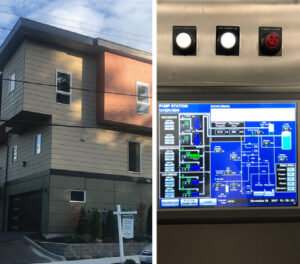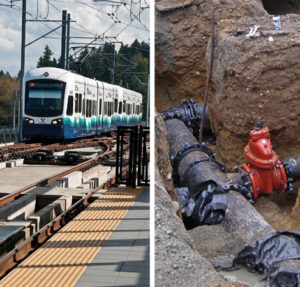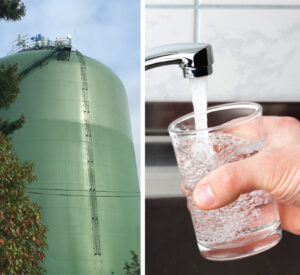Reliable infrastructure requires reliable planning, funding, investment, and follow-through.
Twenty Year Plan In Place
 Every ten years, all water providers in Washington state are required to complete a Comprehensive Water System Plan Update. This effort helps us ensure that our water system, along with its associated operations, staff, and equipment, are all being managed and maintained as safely, efficiently, and cost-effectively as possible.
Every ten years, all water providers in Washington state are required to complete a Comprehensive Water System Plan Update. This effort helps us ensure that our water system, along with its associated operations, staff, and equipment, are all being managed and maintained as safely, efficiently, and cost-effectively as possible.
As detailed in several newsletter issues over a year, with an overview in one of our blog posts, we began updating our Water System Plan in early 2018, completed it in 2019, and are pleased to report that it was recently been approved by King County and our state’s Department of Health.
This plan lays out the groundwork for the next 20 years, including the system’s operations, design standards, infrastructure improvements, and financing.
Utility Tax Reinvested Again
 Every water, sewer, and solid waste utility in Washington state pays a utility tax to the state. A portion of these taxes are placed in the Public Works Assistance Account (PWAA)—a fund from which utilities can obtain low interest loans for utility infrastructure improvements.
Every water, sewer, and solid waste utility in Washington state pays a utility tax to the state. A portion of these taxes are placed in the Public Works Assistance Account (PWAA)—a fund from which utilities can obtain low interest loans for utility infrastructure improvements.
Numerous public entities, including the Cities of Lake Forest Park and Shoreline, along with Lake Forest Park Water District, Northshore Utility District, Ronald Wastewater District, Highlands Sewer District, and North City Water District have all drawn funds from the PWAA to keep the cost of infrastructure and capital improvements (and resulting utility rates) low.
Beginning in 2005, state Legislators began siphoning off funds from this account to help offset other costs. Thanks to the tireless efforts of the PWAA Board members (including our District Manager, who’s been on the Board for the past eight years), and Senator Frockt from the 46th Legislative District, who chaired the Capital Budget bill, 2021 will be the first year that Public Works Assistance Account funds will once again be utilized for their originally-intended purpose: reinvesting in our infrastructure.
Ongoing Infrastructure Improvements
North City Water District is planning to apply for low-interest PWAA loans for several projects that will enable us to reduce risk and improve our resiliency in the event of earthquakes and other disasters, including upgrading our two booster stations, and constructing a new reservoir.
We have developed and regularly update a comprehensive hydraulic model that enables us to analyze, predict, and proactively address development impacts to the system. This approach enables us to maximize the overall life cycle of system components. Case in point: existing water mains that still have more than adequate life can continue to operate until the demand for both domestic water flow and fire flow increases to the point that requires the installation of larger water mains.
Wherever possible, we work closely with developers to construct and install new systems and components that not only meet current standards, but save our ratepayers money by building the cost of these improvements into the cost of their development.
Utility Rates Reinvested
 As a Special Purpose District, we take great pride in our 100% focus on your water system, and the fact that we dedicate 100% of your dollars back into your water system and its operation.
As a Special Purpose District, we take great pride in our 100% focus on your water system, and the fact that we dedicate 100% of your dollars back into your water system and its operation.
Our only sources of revenue come from water rates and related charges, including interest, penalties, hook up fees, and rents. We use a Cash-Needs Approach to develop our revenue requirement for our annual budget each Fall. The only fees on our invoices are pass-through franchise fees from the Cities of Lake Forest Park and Shoreline, for which we negotiated agreements that limit these fees to 6% per city. Unlike a city-owned utility, we can not impose a tax.
Compare this to the City of Federal Way, who in addition to a 3% franchise fee on water and sewer utilities, recently adopted an additional 7.75% utility tax. 10.75% of every utility bill now goes into the City’s general fund.
Yes, this is legal, as per the Municipal Research Services Center (MRSC): “Any city or town in Washington state may impose a utility business and occupation (B&O) tax—also known as a utility tax—upon the income (as defined by local ordinance) of public and private utilities providing service within the boundaries of that city. There is no limit prescribed by state or federal law on sewer, solid waste, stormwater and water utilities.”
This is why some Cities may seek to take over these utilities. They can be used as a vehicle for additional revenue with a utility tax—a tax that can be raised as high as they want, as often as they want, and used for whatever they want. Worst of all, this tax never requires a public vote.
